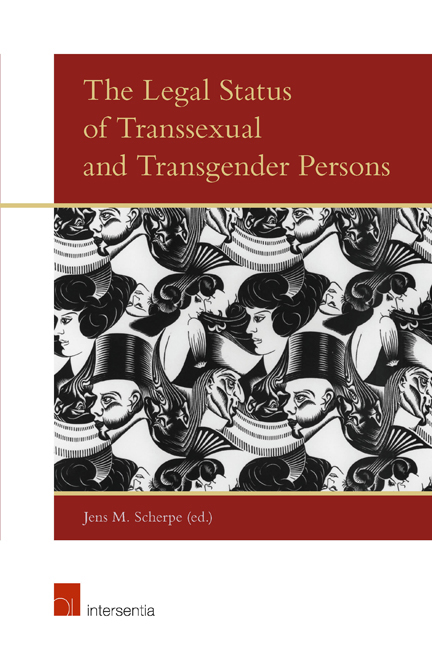Book contents
- Frontmatter
- Dedication
- Preface
- Contents
- List of Contributors
- Introduction
- PART I MEDICAL/PSYCHOLOGICAL VIEWS
- PART II CHRISTIAN VIEWS
- PART III LEGAL VIEWS
- Europe
- Belgium and the Netherlands
- Czech Republic
- Denmark
- England and Wales
- Germany
- Ireland
- Italy
- Spain
- Sweden
- Turkey
- Asia
- Australia and New Zealand
- North and South America
- PART IV CONCLUSION
Czech Republic
from Europe
Published online by Cambridge University Press: 28 November 2017
- Frontmatter
- Dedication
- Preface
- Contents
- List of Contributors
- Introduction
- PART I MEDICAL/PSYCHOLOGICAL VIEWS
- PART II CHRISTIAN VIEWS
- PART III LEGAL VIEWS
- Europe
- Belgium and the Netherlands
- Czech Republic
- Denmark
- England and Wales
- Germany
- Ireland
- Italy
- Spain
- Sweden
- Turkey
- Asia
- Australia and New Zealand
- North and South America
- PART IV CONCLUSION
Summary
INTRODUCTION
This chapter argues that although the legal recognition of transsexuality came early in the Czech Republic, the social and legal understanding and recognition of transgender identity and transgender people's rights has been and continues to be limited. I understand transsexuality as the desire to undergo (or having undergone) ‘gender reassignment treatment/surgery’ and consider legal provisions that are exclusively tied to physical transition as addressing transsexuality. I understand transgender to be a wider concept, which includes but goes beyond transsexuality, and entails the desire to live in (or living in) the role of a gender which is not the one designated at birth. The chapter's main argument is that while Czech law has to some extent addressed concerns of those who wish to ‘fully transition’ – such as the possibility of a name change and birth-record change connected to sex/gender confirmation surgery – it has not paid attention to those transgender people who do not wish to do so.
The law is based on a heteronormative, biological, and dualistic understanding of sex (rather than gender). First, its heteronormative character manifests itself in the requirement that a marriage be dissolved before a person can submit to sex/gender confirmation surgery. It continues to be unthinkable for Czech law that two persons of the same sex could be married. Second, the biological attachment to ‘sex’ is apparent in the requirement of surgical intervention for any legal recognition of a person's preferred sex/gender. The law recognises the possibility that ‘biological sex’ and ‘psychological sex’ are misaligned. And it now enables their ‘realignment’, medically and legally. What it does not recognise is the possibility that gender identity can be different from biological sex, without a person wishing to physically modify their body, including their sex characteristics. The law does not accept that it might be called to recognise such a situation and enable some legal recognition of a person's preferred legal sex/gender or allow for a name change without that person first having submitted to gender confirmation surgery. Czech law can thus be said to address transsexual rather than transgender issues. Third, the law is incapable of transcending the sex binary.
- Type
- Chapter
- Information
- The Legal Status of Transsexual and Transgender Persons , pp. 125 - 146Publisher: IntersentiaPrint publication year: 2015

